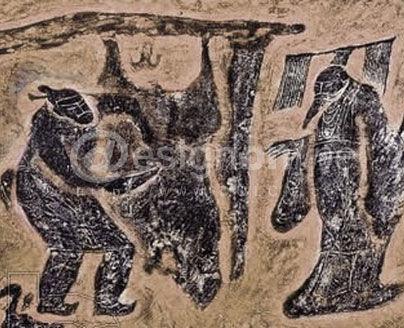Cook Ding (Ting) was cutting up an ox for the King Wén-huì. Whenever he applied his hand, leaned forward with his shoulder, planted his foot, and employed the pressure of his knee, in the audible ripping off of the skin, and slicing operation of the knife, the sounds were all in regular cadence. Movements and sounds proceeded as in the dance of 'the Mulberry Forest' and the blended notes of 'the King Shâu.'
The King said, 'Ah! Admirable! That your art should have become so perfect!'
Having finished his operation, the cook laid down his knife, and replied to the remark, 'What your servant loves is the method of the Dào (Tâo), something in advance of any art. When I first began to cut up an ox, I saw nothing but the entire carcase. After three years I ceased to see it as a whole. Now I deal with it in a spirit-like manner, and do not look at it with my eyes. The use of my senses is discarded, and my spirit acts as it wills. Observing the natural lines, my knife slips through the great crevices and slides through the great cavities, taking advantage of the facilities thus presented. My art avoids the membranous ligatures, and much more the great bones.
'A good cook changes his knife every year;-- it may have been injured in cutting; an ordinary cook changes his every month;-- it may have been broken. Now my knife has been in use for nineteen years; it has cut up several thousand oxen, and yet its edge is as sharp as if it had newly come from the whetstone. There are the interstices of the joints, and the edge of the knife has no appreciable thickness; when that which is so thin enters where the interstice is, how easily it moves along! The blade has more than room enough. Nevertheless, whenever I come to a complicated joint, and see that there will be some difficulty, I proceed anxiously and with caution, not allowing my eyes to wander from the place, and moving my hand slowly. Then by a very slight movement of the knife, the part is quickly separated, and drops like a clod of earth to the ground. Then standing up with the knife in my hand, I look all round, and in a leisurely manner, with an air of satisfaction, wipe it clean, and put it in its sheath.'
The King Wén-huì said, 'Excellent! I have heard the words of my cook, and learned from them the nourishment of our life.'
The King said, 'Ah! Admirable! That your art should have become so perfect!'
Having finished his operation, the cook laid down his knife, and replied to the remark, 'What your servant loves is the method of the Dào (Tâo), something in advance of any art. When I first began to cut up an ox, I saw nothing but the entire carcase. After three years I ceased to see it as a whole. Now I deal with it in a spirit-like manner, and do not look at it with my eyes. The use of my senses is discarded, and my spirit acts as it wills. Observing the natural lines, my knife slips through the great crevices and slides through the great cavities, taking advantage of the facilities thus presented. My art avoids the membranous ligatures, and much more the great bones.
'A good cook changes his knife every year;-- it may have been injured in cutting; an ordinary cook changes his every month;-- it may have been broken. Now my knife has been in use for nineteen years; it has cut up several thousand oxen, and yet its edge is as sharp as if it had newly come from the whetstone. There are the interstices of the joints, and the edge of the knife has no appreciable thickness; when that which is so thin enters where the interstice is, how easily it moves along! The blade has more than room enough. Nevertheless, whenever I come to a complicated joint, and see that there will be some difficulty, I proceed anxiously and with caution, not allowing my eyes to wander from the place, and moving my hand slowly. Then by a very slight movement of the knife, the part is quickly separated, and drops like a clod of earth to the ground. Then standing up with the knife in my hand, I look all round, and in a leisurely manner, with an air of satisfaction, wipe it clean, and put it in its sheath.'
The King Wén-huì said, 'Excellent! I have heard the words of my cook, and learned from them the nourishment of our life.'

Comments